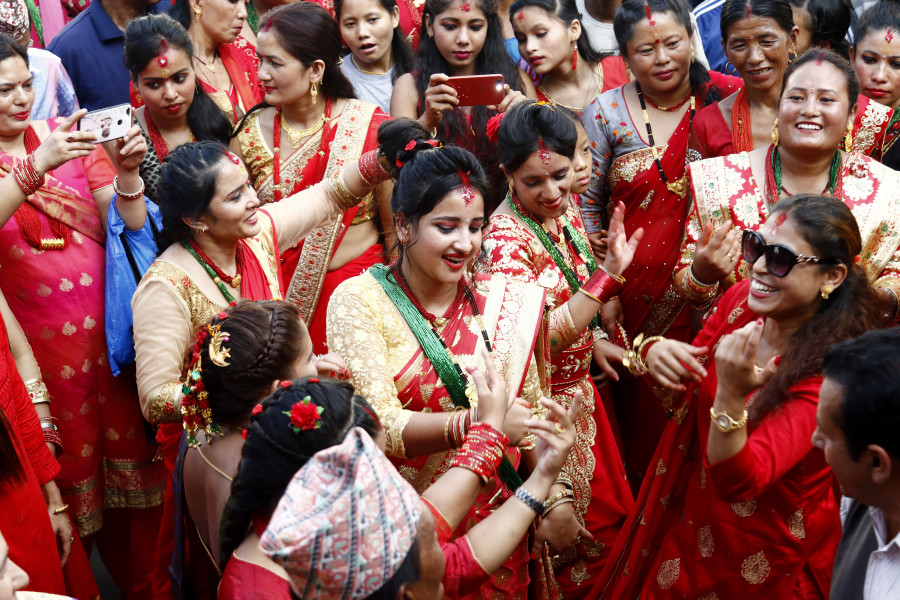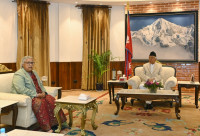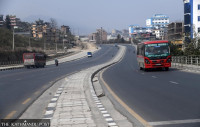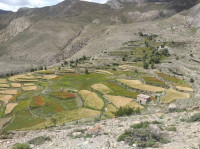National
Girls just wanna have fun on Teej, but men won’t let them
Nepali internet is divided over how Nepali women should celebrate Teej.
Bhrikuti Rai & June Karkee
It’s not just catchy tunes that precede Teej these days—controversies make an early appearance. Debates around the significance of the festival, where women traditionally fast for their husbands’ longevity, continue over the media and on social media. And with a lot more women choosing to celebrate Teej their own way, moral policing often comes thick and fast, with men pointing to women’s partying, dancing and making merry as a sign of debauchery.
For 21-year-old Sujana Sunuwar, an undergraduate student in the US, and her friends, their Teej celebrations over the weekend became an object of ridicule.
It started off as a fun Teej party where Sunuwar’s friends, after dancing and singing, posed for a picture, pretending to drink wine straight from the bottle. Hours after her friend posted that picture to her Facebook story, Sunuwar started getting screenshots of meme pages that had used the image, ridiculing the manner in which Nepali women celebrating darr, the hearty feast before Teej.
“I was infuriated when I first saw that post. It was wrong in the way it was being portrayed and circulated,” Sunuwar told the Post over Facebook Messenger. “I was mad because this picture was being shared with and made fun of by people whom we did not even want to see it in the first place.”
After much back and forth with the admin of the Meme Purbeli page, one of the many meme pages that had reposted her picture, he took the post down. But he agreed to do so on the condition that Sunuwar also remove her review of the page, where she had criticised the use of her image.
In addition to inspiring memes on social media, Teej celebrations have also caught the attention of authorities, and male politicians like the chairman of the National Assembly, Ganesh Prasad Timalsina, who said last week that “Teej shouldn’t be a flashy affair”. Kaski district authorities went a step ahead and issued a strongly worded letter in late July saying they will be closely monitoring extravagant pre-Teej celebrations, and taking legal action against events that undermine “traditional values”.
Teej has also aroused mixed conversations from both men and women on the significance of the festival itself. Some praised the ways in which the dynamics of Teej have taken on more modern and feminist tone, becoming more accepting of womens’ individual choices.
One Twitter user wrote: “Loving how the paradigm of #Teej has shifted these days from being a festival of fasting for men to women enjoying for themselves. Amazing to see how women care less about the fasting part these days. Will fast only if I want to attitude. Love it!”
Others, however, were quick to criticise the festival for being hypocritical and continuing to cling on to traditional notions of patriarchy.
“Fasting on Teej, offering prayers at temples in expectation of long life for husband is like working overtime every day and expecting promotion for a fellow worker,” tweeted another user.
But for Nepali women wanting to define and embrace Teej on their own terms, comments and criticism like the kind that Sunuwar and her friends received only undermine their experience, as expressed by one Twitter user’s frustrations:
“Happy Mansplaining day! Because all I see is men trying to explain women how to celebrate teej without making it भड्किलो because Teej being for men is not enough.”
The unending debate on who does and does not get to have an opinion on Teej and how it is celebrated speaks to the friction that continues to persist between the traditionally patriarchial Nepali society and more modern feminist sphere.
A recent Nepali Teej song Haami Pani Naachnu Parcha Bichha Bichhama—We Also Want to Dance in the Middle—made its rounds on social media, and drew praise from men, for whom the song was seen as promoting inclusivity, and criticism from women, who felt that they were being belittled.
To mock this dispute, one Twitter user wrote: “Nepali feminists: Men are slowly trying to take over the special women’s festival by dancing ‘bicha bichama! Just a heads up and yeah you are welcome!’




 10.95°C Kathmandu
10.95°C Kathmandu
















